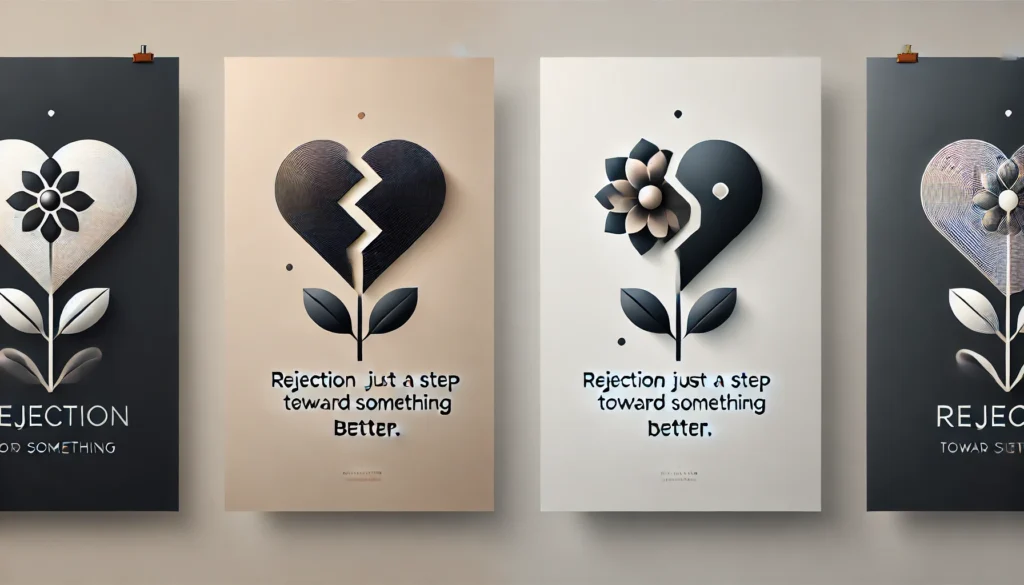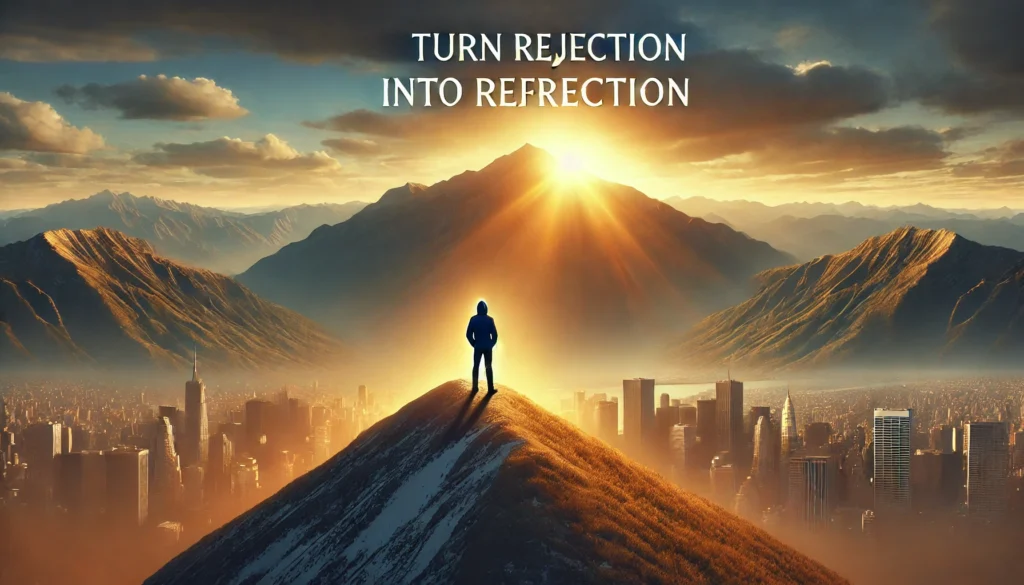Introduction: Why Does Rejection Hurt So Much?
Have you ever felt that sinking feeling in your chest after being turned down? Maybe it was a job you really wanted, a crush you hoped would feel the same way, or a friend who suddenly distanced themselves. That sting of rejection isn’t just in your head—it’s real, and it hurts more than we often expect.
But why?
Rejection isn’t just an emotional bruise; it’s a biological reaction hardwired into us through evolution. Studies show that the brain processes rejection the same way it processes physical pain—activating the same neural pathways that fire when you stub your toe or suffer an injury. No wonder it feels like a punch to the gut!

The Science Behind Rejection: Why It Feels So Personal
🔹 Evolutionary Perspective: Humans are social creatures. Our ancestors depended on strong social bonds for survival—being rejected from a tribe often meant death. Over time, our brains evolved to treat social exclusion as a life-threatening event, triggering distress signals whenever we feel unwanted.
🔹 Neuroscience of Rejection: Research using fMRI brain scans reveals that the dorsal anterior cingulate cortex, the same region responsible for physical pain, lights up when we experience rejection. This means that emotional pain is not “all in your head”—it’s a real, measurable experience.
🔹 Self-Worth & Identity: When we’re rejected, especially in personal relationships or careers, it challenges our sense of belonging and self-worth. Our minds start asking, “Am I not good enough?”—but this internal dialogue, while natural, can be misleading and harmful.
Why Do Some People Handle Rejection Worse Than Others? (Search Intent: “why do I deal with rejection so badly?”)
Rejection doesn’t affect everyone the same way. For some, it’s a small setback; for others, it feels like a life-altering event. Here’s why:
✅ Rejection Sensitivity: Some individuals have Rejection Sensitive Dysphoria (RSD), a condition linked to ADHD and high emotional sensitivity, where rejection—real or perceived—triggers intense emotional distress. (Search Intent: “how to deal with rejection sensitive dysphoria?”)
✅ Past Experiences: If someone has faced repeated rejection in childhood, relationships, or work, they may develop a deep-seated fear of being unwanted, making each rejection feel catastrophic.
✅ Negative Self-Talk: Our inner dialogue plays a major role in how we process rejection. Those who already struggle with low self-esteem or anxiety often interpret rejection as proof that they are inherently unworthy.
How to Stop Taking Rejection So Personally (Search Intent: “why can’t I deal with rejection?”)
The pain of rejection is real but manageable. Here’s how you can start detaching emotionally and shifting your perspective:
💡 Reframe the Narrative: Instead of thinking, “I wasn’t good enough,” try, “This wasn’t the right fit for me.” Often, rejection has little to do with your worth and more to do with timing, preferences, or external factors.
💡 Challenge Negative Thoughts: Ask yourself:
- Is this rejection really about me, or are there other factors at play?
- Am I catastrophizing this, assuming it defines my future?
- Would I talk to a friend this harshly if they were rejected?
💡 Recognize Rejection as Redirection: Sometimes, not getting what you want is a blessing in disguise. That job rejection? It might lead to a better opportunity. That breakup? It could be making space for a healthier relationship.
💡 Shift Your Focus: Instead of dwelling on the pain, focus on what’s next. Ask yourself, “What can I learn from this?” and channel your energy into self-improvement, personal growth, or new opportunities.
Final Thoughts: Rejection Doesn’t Define You—It Refines You
Rejection is painful, but it’s not a statement about your worth—it’s simply an experience. Everyone, even the most successful people, have faced rejection at some point. The difference is how they respond to it.
🚀 Up Next: In the next section, we’ll explore specific, actionable strategies to deal with rejection in any situation—whether it’s love, career, or friendships. Stay with us!
Why Is It So Hard to Deal with Rejection?
(Search intent: “why is it so hard to deal with rejection?”)
Rejection stings—whether it’s being passed over for a dream job, ghosted by someone you liked, or left out of plans by friends. It doesn’t just bruise the ego; it can feel like a deep wound, leaving you questioning your worth. But why does rejection hit so hard—sometimes even harder than physical pain?
The answer lies in a powerful mix of biology, psychology, and personal history.
The Science: How Rejection Triggers the Brain’s Pain Center

Ever felt like rejection physically hurts? You’re not imagining it. Brain scans reveal that rejection activates the same neural pathways as physical pain.
🔬 fMRI studies show that the dorsal anterior cingulate cortex, the brain region associated with physical pain, lights up when we experience social rejection—just like it would if you stubbed your toe or burned your hand.
This explains why rejection doesn’t just “feel bad”—your brain perceives it as an actual injury.
💡 Key takeaway: Rejection isn’t just emotional—it’s a neurochemical response that your body takes seriously.
Evolutionary Perspective: Humans Are Wired for Social Belonging
Thousands of years ago, being rejected from a group wasn’t just disappointing—it was dangerous. Our ancestors relied on strong social bonds for survival, and isolation often meant death.
As a result, the human brain evolved to treat rejection as a serious threat, triggering stress responses like increased heart rate, anxiety, and even obsessive thoughts about being left out.
Fast forward to today, and while a romantic rejection or job denial won’t kill you, your brain still reacts as if it might. That’s why the pain of rejection feels so intense.
💡 Key takeaway: Your reaction to rejection is not a weakness—it’s an ancient survival mechanism at play.
Emotional Triggers: Self-Doubt, Fear of Failure & Past Trauma
Rejection isn’t just about the situation at hand—it amplifies deeper insecurities we may already have.
✅ Self-Doubt – “Am I not good enough?”
✅ Fear of Failure – “What if this keeps happening?”
✅ Past Trauma – Early experiences with rejection (e.g., childhood neglect, social exclusion, past heartbreaks) can magnify the emotional pain of rejection today.
For some, rejection is a fleeting disappointment. For others, it’s a spiral of self-blame and anxiety—but why?
Why Do I Deal with Rejection So Badly?
(Search intent: “why do I deal with rejection so badly?”)
Some people bounce back quickly, while others struggle for weeks or even months. What makes the difference?
1️⃣ High Rejection Sensitivity – If you have Rejection Sensitive Dysphoria (RSD)—common in ADHD and highly sensitive individuals—you may experience rejection more intensely than others.
2️⃣ Past Experiences – If you’ve faced repeated rejection in relationships, friendships, or work, your brain learns to expect it, making every new rejection feel worse.
3️⃣ Low Self-Esteem – If rejection confirms an already negative self-belief, it can be harder to shake off.
💡 Key takeaway: If rejection feels overwhelming, it’s not your fault—your brain and past experiences shape your emotional response. But the good news? You can rewire your response with the right strategies.
What’s Next?
Now that we understand why rejection feels so painful, the real question is: how do we handle it?
👉 In the next section, we’ll explore practical, science-backed strategies to help you process rejection, rebuild your confidence, and move forward—without letting it define you.
🔽 Keep reading: How to Deal with Rejection in Any Situation. 🚀

